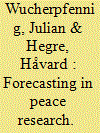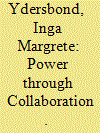| Srl | Item |
| 1 |
ID:
152293


|
|
|
|
|
| Summary/Abstract |
Prediction and forecasting have now fully reached peace and conflict research. We define forecasting as predictions about unrealized outcomes given model estimates from realized data, and predictions more generally as the assignment of probability distributions to realized or unrealized outcomes. Increasingly, scholars present within- and out-of-sample prediction results in their publications and sometimes even forecasts for unrealized, future outcomes. The articles in this special issue demonstrate the ability of current approaches to forecast events of interest and contributes to the formulation of best practices for forecasting within peace research. We highlight the role of forecasting for theory evaluation and as a bridge between academics and policymakers, summarize the contributions in the special issue, and provide some thoughts on how research on forecasting in peace research should proceed. We suggest some best practices, noting the importance of theory development, interpretability of models, replicability of results, and data collection.
|
|
|
|
|
|
|
|
|
|
|
|
|
|
|
|
| 2 |
ID:
160869


|
|
|
|
|
| Summary/Abstract |
Who gets what in high-level European Union (EU) negotiations and how? This study draws on data concerning stakeholder preferences during heated negotiations leading to the EU’s 2030 Climate and Energy Policy Framework. It tests the explanatory values of Liberal Intergovernmentalism (LI), the Advocacy Coalition Framework (ACF), and Historical Institutionalism (HI). Large member states were key (LI). However, coordinated groups of member states, bound by specific common interests, also played crucial roles. ACF explains the 2030 Framework only if: a) the decisive coalitions consisted of the EU’s supranational institutions, the coordinated groups of member states and long-term advocacy coalitions in the interest group community; b) coalition members held comparatively similar views; and c) coalition members adjusted their strategies mutually and/or shared information. The European Commission set the agenda (HI). The analysis demonstrates that LI, HI and ACF may be used as complementary analytical tools, filling several of each other’s gaps.
|
|
|
|
|
|
|
|
|
|
|
|
|
|
|
|